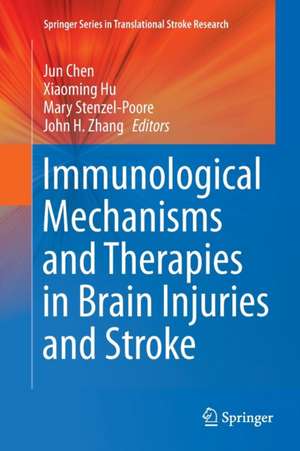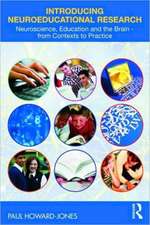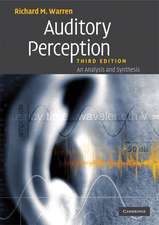Immunological Mechanisms and Therapies in Brain Injuries and Stroke: Springer Series in Translational Stroke Research, cartea 6
Editat de Jun Chen, Xiaoming Hu, Mary Stenzel-Poore, John H. Zhangen Limba Engleză Paperback – 23 aug 2016
| Toate formatele și edițiile | Preț | Express |
|---|---|---|
| Paperback (1) | 949.23 lei 6-8 săpt. | |
| Springer – 23 aug 2016 | 949.23 lei 6-8 săpt. | |
| Hardback (1) | 955.40 lei 6-8 săpt. | |
| Springer – 10 noi 2013 | 955.40 lei 6-8 săpt. |
Preț: 949.23 lei
Preț vechi: 1157.60 lei
-18% Nou
Puncte Express: 1424
Preț estimativ în valută:
181.63€ • 189.66$ • 149.99£
181.63€ • 189.66$ • 149.99£
Carte tipărită la comandă
Livrare economică 15-29 aprilie
Preluare comenzi: 021 569.72.76
Specificații
ISBN-13: 9781493944958
ISBN-10: 1493944959
Pagini: 396
Ilustrații: X, 386 p. 34 illus., 21 illus. in color.
Dimensiuni: 155 x 235 x 21 mm
Greutate: 0.55 kg
Ediția:Softcover reprint of the original 1st ed. 2014
Editura: Springer
Colecția Springer
Seria Springer Series in Translational Stroke Research
Locul publicării:New York, NY, United States
ISBN-10: 1493944959
Pagini: 396
Ilustrații: X, 386 p. 34 illus., 21 illus. in color.
Dimensiuni: 155 x 235 x 21 mm
Greutate: 0.55 kg
Ediția:Softcover reprint of the original 1st ed. 2014
Editura: Springer
Colecția Springer
Seria Springer Series in Translational Stroke Research
Locul publicării:New York, NY, United States
Cuprins
Old dogmas, surprising complexities, and novel therapeutic targets.- The critical roles of immune cells in acute brain injuries.- Vascular Inflammation in Ischemic Stroke: Adhesion Receptors Controlling Leukocyte-Endothelial Interactions.- Immune Cell-Derived Free Radicals in Acute Brain Injury.- The complement cascade in acute brain injury.- Matrix Metalloproteinases as an Inflammatory Mediator in the Neurovascular Unit.- Toll-Like Receptors in Ischemic Stroke and other Acute Brain Injuries.- Ion Transporters in Microglial Function: New therapeutic targets for neuroinflammation in ischemic stroke?.- Inflammation After Acute Brain Injuries Affects the Developing Brain Differently than the Adult Brain.- Systemic Immune Responses after Experimental Stroke.- Infectious Burden and Risk of Stroke.- Inflammatory Biomarkers in Patients with Acute Brain Injuries.- In vivo Imaging of Neuroinflammation in Acute Brain Injury.- Inflammation as a therapeutic target after subarachnoid hemorrhage:advances and challenges.- Minocycline, a Tetracycline Derivative, as a Potential Protective Agent for Acute Stroke.- Tolerization to Brain and Vascular Antigens: Targeting Autoimmunity after Acute Brain Injuries and Preventing Stroke.- The Role of PPARg in Stroke.- CD36: an inflammatory mediator in acute brain injury.- Cool Down the Inflammation: Hypothermia as a Therapeutic Strategy for Acute Brain Injuries.- Index.
Recenzii
“This is an outstanding book on immune molecular andcellular treatment for brain injury and ischemia. … I recommend this book forall brain injury, stroke, and trauma investigators. This monograph is wellwritten and profusely covered with pictures and postmortem slides reinforcingthe concepts discussed. Students of Neurology and Neurosurgery will also findthis a useful reference and stand alone book.” (Joseph J. Grenier, Amazon.com,October, 2015)
Textul de pe ultima copertă
Recent research has revealed the importance of immunological mechanisms and inflammation in delaying damage and/or promoting repair after an acute injury to the central nervous system. This book provides a comprehensive and up-to-date overview of the role of immunological mechanisms and therapies for treating acute neurological injuries such as cerebral ischemia, hemorrhage, and brain and spinal cord trauma. In several sections, the contributing authors provide a review of immunological mechanisms involved in neurological injury and of various translational and clinical research aimed at harnessing those mechanisms for better patient outcomes.
Caracteristici
Explores the role of inflammation and immunological mechanisms in protecting the CNS during injury Looks at translational and clinical research Provides a comprehensive up-to-date overview Includes supplementary material: sn.pub/extras

























